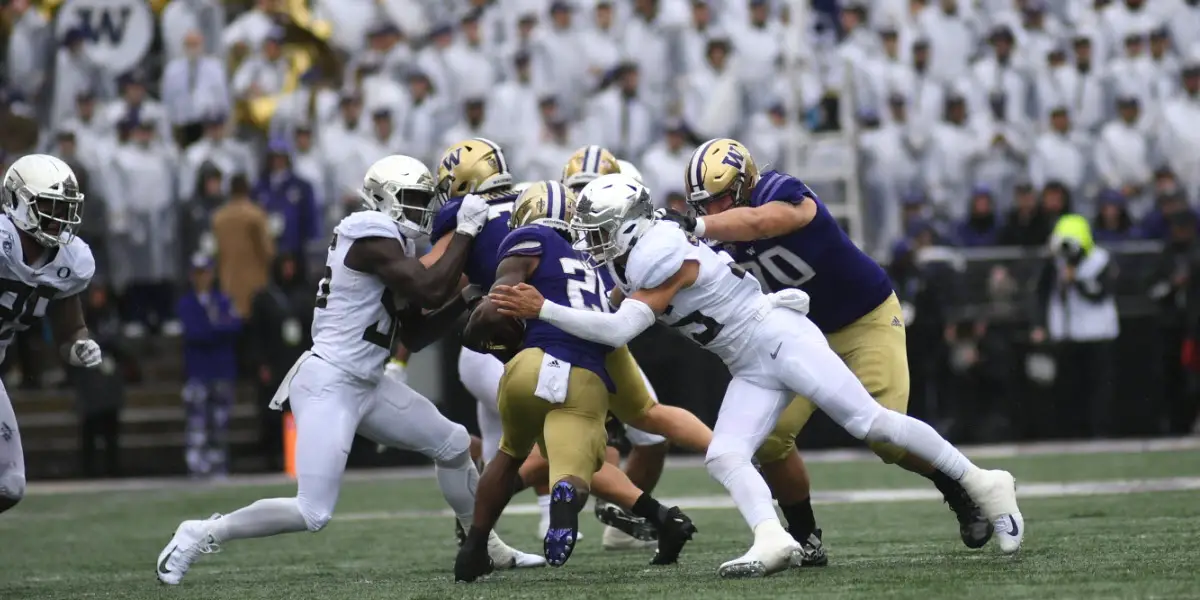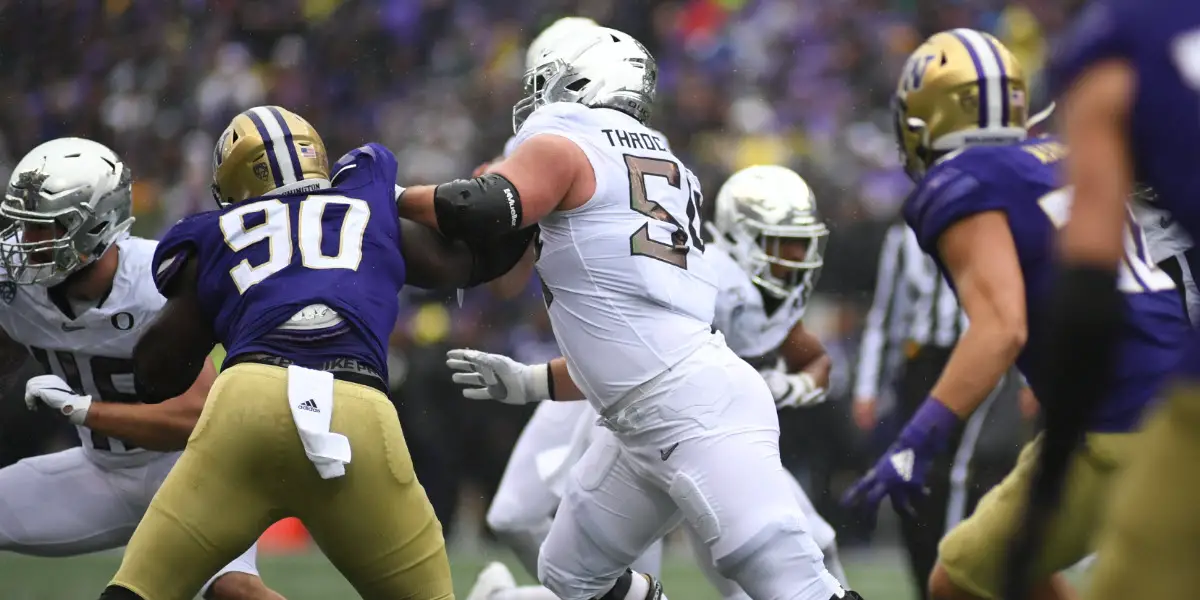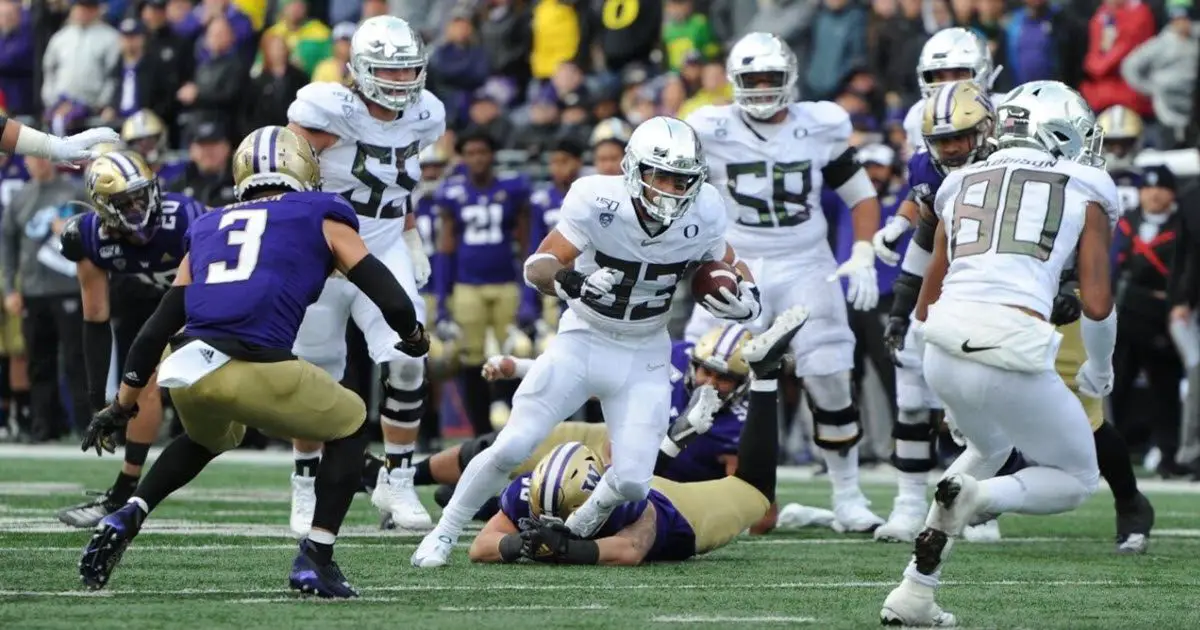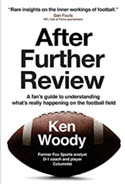Oregon coach Mario Cristobal had his greatest victory as a head coach and by the most satisfying means possible — a tough, resilient defense and a powerful offense that mixed creativity with hammer and tong to knock off Washington 35-31 after playing much of the game behind on the scoreboard.
There were many surprised by the creative use of screen passes by offensive coordinator Marcus Arroyo, which killed the Huskies in the red zone. It’s a big advantage having players at all positions being strong, aggressive blockers, but another is having a wealth of skilled players who can catch and run. That skill is prominently featured in this new-looking offense, which is more exciting and creative than the one that brought out so much second-guessing and criticism for boring conservatism earlier in the season.
Those surprised the most had to be 70,000 fans in Husky Stadium, their football team, and their coaches, who for long periods of time have ruled the roost in the Pac-12 as the most physical and powerful team around. The Huskies played well, but the Ducks played better, and tougher, when it mattered the most.

Troy Dye is such a warrior …
Two Ducks that sucked it up were quarterback Justin Herbert and linebacker extraordinaire Troy Dye, who played with a thumb broken from the first quarter on. Herbert’s head was somewhere else after a great start and then was lost, missing several passes in a row. Finally, Herbert began to set his feet before throwing and his accuracy came back, with the aid of strategic play calling by Arroyo. He finished the game with four touchdown passes and gave up no turnovers in a fascinating duel with Washington’s excellent quarterback Jacob Eason.
Dye gave himself up, diving over a running back attempting to block him on a blitz, flushing Eason out of the pocket, where he was sacked by Popo Aumavae for a loss on the Huskies’ last drive of the game. It was the only sack of the game yielded by two outstanding offensive lines, and it helped set up the fourth-and-three play: a quick post that was defended closely by freshman corner Mykael Wright.
That was it — a bitterly fought game with neither team giving any quarter. It was a victory a hard-nosed coach could savor for a long time: well earned, and as Cristobal said after the game, “The tougher it gets, the better we play; this validates all the hard work we put in.” This victory was all of that and more.
Oregon’s first touchdown (above) was on a run-pass option to Spencer Webb (No. 18), filling in for the injured Jacob Breeland. The offensive line is blocking a run play, which convinces the Huskies’ left-side linebacker that the Ducks are running the ball, and he steps up to tackle what he thinks is the ball carrier. Herbert reads his reaction, takes the ball out of the mesh with the running back, and hits Webb with a scoring strike, his 35th-straight game with a touchdown pass.
The play is so difficult to defend because the O-line is blocking a running play while the tight end is releasing on a seam pass route. Note the offensive linemen holding up at four yards past the line of scrimmage, right around the limit they’re allowed to be downfield on a pass play. Going any further would be a penalty for ineligible men being too far past the line of scrimmage. This shows the discipline Cristobal has instilled in his players, as games and situations like this in a heated rivalry often make a player lose his head to his emotions.
Husky head coach Chris Petersen, looking to stall Oregon’s momentum after their scoring drive on the game’s first possession and get his Huskies going, (above) was apparently unaware of the relatively new rule that forbids a player on the receiving team from laying down in the end zone on kickoffs. The tactic is used to deceive the covering team, which loses sight of the player while sprinting to cover the kick in the opposite corner of the field. The player’s jersey color blends in with the color of the end zone, and then he gets up to receive a long lateral outside the cover team.
The rule came about because a player who goes down on the field to deceive may actually be injured or out of the play. This whole situation, and the embarrassment coming to Petersen, might have been avoided if the coach had told of his trick play to the referees before the game, customary for most head coaches who don’t want the refs surprised by the play when it happens.
Evidently, the Husky headman has a reputation for not revealing his tricks before the game, either to the media or the referees. That cost him in this case. If it were legal, it would have been a great momentum changer for his team and the capacity crowd in Husky Stadium, but in the end, too bad for the Huskies.
Maybe it was bound to happen, but the Duck defense (above) gave up its first play over 40 yards in the season, this a 48-yard touchdown pass from Eason to Jordan Chin. Oregon’s secondary is mixed up: the corner on the bottom and the linebackers are playing man-to-man, and safety Nick Pickett (No. 16) is lined up only 12 yards deep, an indication of man cover for him. Thomas Graham (No. 4), the corner on the right, drops in a zone look, outside of the receiver and turned in towards the quarterback as he backpedals, apparently looking for help from his safety, who is missing in action.
Pickett does not retreat and jumps a crossing route that is also being covered by a linebacker, leaving the deep middle wide open and his corner without help. On this play, either Pickett or Graham were wrong — if it’s zone defense, Pickett is not watching the quarterback and is actually going across the field after the ball is thrown to the other side. In zone, a safety has to have his head on a swivel and know where the quarterback is throwing, which is not the case here.
If it was man defense, Graham was wrong, giving up his cushion and the inside post to the wide receiver. On television after the play, you could see Graham angrily talking to Pickett, but maybe he was wrong, not Pickett. If there’s indecision in the secondary, it’s better for the safety to play zone so he doesn’t give up a big-play touchdown. This is definitely something that needs to be ironed out before taking on the pass-happy Washington State Cougars this weekend.
The Huskies have a six-man blitz, (above) but it’s in the wrong direction (to Oregon’s right), while the Ducks have a quick screen called to the left, taking advantage of left tackle Penei Sewell’s (No. 58) great athleticism and speed to kick out block the Huskies’ edge defender. Jaylon Redd (No. 30) motions across the formation, shadowed man-to-man, revealing the Husky coverage.
Bryan Addison (No. 80) sets up Sewell’s block and then releases to make a key block downfield. Redd does an excellent job of reacting to blocks after helping set up Sewell’s man to be mashed before cutting into the end zone for the score.
The Huskies’ safety, lined up on the eight-yard line, is so late on covering the faking Duck running back, he never sees the ball thrown and is running the wrong way while Herbert throws to Redd. Note that Redd has six Duck blockers leading him into the end zone against two Husky defenders.
Cyrus Habibi-Likio is coming on as a featured running back whose specialty is power running. On this first play, (above) he runs for seven yards as the Duck offense gets physical; note the lower pad level of Oregon’s push and the excellent combo block by left guard Shane Lemieux (No. 68) and Sewell (No. 58) at left tackle. The Huskies’ front is getting tired and worn down.
The Huskies are slow to line up on defense as Oregon’s tempo is getting to them. On this play, (above) backup tight end Hunter Kampmoyer (No. 48) is aligned in a wing position to the right and pulls to kick out the edge defender so Habibi-Likio can get up a head of steam. The Huskies, who have only ten men on the field, look disorganized.
At the snap, the Oregon front caves in the Dogs’ front with a lower pad level than the fatigued defense. Habibi-Likio looks like an All American leaping over a tackler and sprinting into the end zone. Note the double team block by Sewell and Lemieux and the blocks by center Jake Hanson (No. 55) and right guard Dallas Warmack (No. 75). This is a picture of total domination.
In this game, the Ducks converted two big fourth-down plays, none more important than this one, (above) a 36-yard score to Mycah Pittman (No. 4) on another screen pass. Pittman goes in motion but turns back before he crosses the formation, losing the defender trying to cover him.
Kampmoyer (No. 48) does an outstanding job of leaping over a defender as he pulls to block the edge defender. Notice Sewell’s key block on the only Husky in a position to tackle Pittman.
Offensive coordinator Arroyo has done an excellent job lately, putting some creativity and imagination into his play calling. This screen pass comes off a concept we saw last year for a touchdown against Washington and this year against Cal. Those plays and this one are the same, but to different players from different formations. Nothing is better than to mix a successful play out of a variety of formations — it makes it hard to anticipate and attack for defensive coordinators.

Calvin Throckmorton had a great game in his home state …
The Ducks are so successful at these screen passes because of their discipline on offense, hard-nosed, skilled blocking by players at every position and plenty of talented skill players who can catch and run in the open field. It’s nice to see that Herbert isn’t just focusing on his “go-to guy” as he did last year. It makes him and the offense so much more difficult to defend.
This week, the ever-dangerous Washington State Cougars come to town to see if they can get their fifth-straight win over the Ducks and their third straight at Autzen. Utah pounded the Cougs two games ago and made it a physical game, the same thing the Ducks need to do. WSU is totally dependent on the pass and they have lost several excellent defenders through graduation. They are set up to be man-handled, or better, Duck-handled.
Coach Ken Woody
Eugene, Oregon Top Photo by Tom Corno
Want to learn from Coach Woody in person? He will be analyzing the prior game each week this season at the 6th Street Grill in Eugene on Wednesdays from 6:00 to 7:30 PM with video analysis and opening it up for questions. Join him and learn more football! Charles Fischer
 Spencer Thomas, the FishDuck.com Volunteer Editor for this article, is an attorney for the Social Security Administration in Atlanta, Georgia, and coaches football at Hillgrove High School in Powder Springs, GA.
Spencer Thomas, the FishDuck.com Volunteer Editor for this article, is an attorney for the Social Security Administration in Atlanta, Georgia, and coaches football at Hillgrove High School in Powder Springs, GA.
Dan Fouts, NFL Hall of Fame, Oregon Ducks quarterback: “Entertaining and easy to understand.”
“Every Oregon fan should have a copy to learn from as I do.” Charles Fischer
Buy the book here to learn from Coach Woody, or give a gift of football, a great gift for the fan who wants to learn and enjoy more of the Duck (or whoever your favorite team is) football experience.
Ken Woody is a former Fox Sports football commentator who played defensive back, receiver and kicker for Oregon from 1966 to 1970. He coached college football for 18 years, including stints as an assistant coach at Oregon, Washington, Washington State and Utah State, and was head coach at Whitman College and Washington University-St. Louis. He writes x’s and o’s, a weekly column in the Register-Guard, RG online coverage of Duck football and is the author of “After Further Review—an inside look at what’s really happening on the football field.” Woody is on KUGN (590 am) 2:45 before kickoff and 30 minutes after each game with coaching and game analysis.
Related Articles:
Ducks, Cristobal Answer Nagging Questions: Are the Ducks for Real?
Ducks Hang on in a Rough Ride with Fresno State
Cristobal: "Time to Coach 'Em Up"
"For Real"-Finally, Cristobal Unleashes Herbert in the Red Rose Zone
Coach Woody Analysis: Run Game Evolution and Opportunistic Defense Stun Utes
Coach Woody Analysis: Ducks Need More than the Pistol to Beat Utah
“I learned football working under many great coaches, among them Len Casanova, Jerry Frei, John Robinson, Bruce Snyder, George Seifert,and Ron Stratten at the University of Oregon, Jim Owens at the University of Washington and Jim Walden at Washington State University. Most of my coaching experience was on the offensive side of the ball with quarterbacks, receivers and kickers although as a head coach I coached defensive backs, linebackers and offensive line.
I achieved my first goal of being the youngest head coach in college football at the age of 26 and throughout my career in coaching and outside of it, as a journalist and broadcaster, have experienced how exciting and gratifying it is teaching the game to others.”


